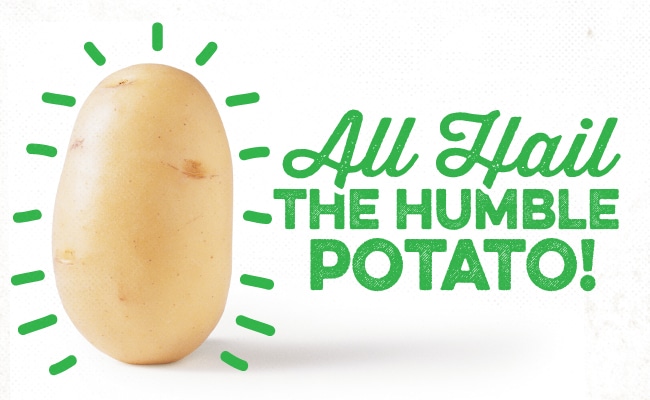
With St. Patrick’s Day tomorrow, people’s thoughts are turning to potatoes a little more than usual.
The rest of the year, however, people don’t think too much about these humble tubers. They hold such a ubiquitous place on our tables that we take them for granted.
So let’s take a moment today to celebrate this underrated foodstuff by unpacking four reasons potatoes are awesome.
1. Potatoes Are Cheap
On average, a pound of potatoes costs .95 cents. In contrast, a pound of ground beef costs over $5. Adding potatoes to your meals is a great way to stretch your grocery budget.
2. Potatoes Can Help You Lose Weight
People started getting down on potatoes a couple decades back as the low-carb movement gained steam. Potatoes are starchy tubers. Starch is a carbohydrate made up of numerous glucose units. Our bodies can quickly break down the starch in a potato and convert it into glucose. The fear is that this glucose will spike blood sugar, and high blood sugar will leave you feeling hungry and cause weight gain.
But carbs don’t necessarily make you fat; it’s eating a caloric surplus of any food that causes weight gain (and eating a caloric deficit of any food that causes weight loss). Thus a better metric for a food’s “healthiness” than its macro breakdown is its volume relative to its calories. Calorically dense foods give you a lot of calories without filling you up, leaving you feeling hungry and more prone to overeating. Foods that are higher in volume relative to their calories leave you feeling satiated, making it easier to eat less.
Potatoes fall into that latter, filling category. While deep-frying and covering taters in butter, cream, and cheese does turn them into an unhealthy, calorically dense food, pure potatoes are high in volume and low in calories: an ounce of Oreos has 140 calories; an ounce of potatoes has 22. It’s hard to overeat plain baked potatoes.
Indeed, in one study on satiety, potatoes were found to be the most satiating of foods, even more so than high-protein foods like steak.
3. Potatoes Are Nutrient-Packed
Brightly colored vegetables get all the “it’s good for you” attention, while the brown tuber is assumed to be a nutritional slouch. But it isn’t so; potatoes are surprisingly rich in nutrients. A skin-on, medium-sized white baked potato contains:
- Vitamin C: 28% of your recommended daily intake — more than an orange!
- Vitamin B6: 27% of your RDI
- Potassium: 26% of your RDI — more than a banana!
- Magnesium: 12% of your RDI
- Fiber: ~3.8 grams
White potatoes and sweet potatoes are pretty nutritionally comparable, by the way. White potatoes have a little more protein; sweet potatoes have a little more fiber. White potatoes contain more potassium and magnesium; sweet potatoes have more calcium and a big spike of vitamin A. White potatoes have a few more carbs; sweet potatoes contain more sugar. Both are similar in terms of calories. Both are nutritious vegetables, and one isn’t really better for you than the other.
4. Potatoes May Be Good for Your Gut Biome
Gut health and gut bacteria are getting a lot of attention these days. Potatoes may contribute to a healthy gut thanks to their resistant starch. Resistant starch is a type of carb that can’t be broken down and digested by the small intestine. Instead, it makes its way through to the large intestine, where it’s then broken down by gut bacteria. This process also helps produce short-chain fatty acids that help nourish the gut microbiome.
I eat potatoes with a protein like chicken breast nearly every day for lunch. They fit my macros and are cheap, filling, tasty, and nutritious. So I say on St. Patrick’s Day, and every day: All hail the humble potato!







